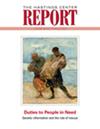挑战 PDMP 算法临床使用中的残疾歧视。
IF 2.3
3区 哲学
Q1 ETHICS
引用次数: 0
摘要
州立处方药监控项目 (PDMP) 使用专有的预测性软件平台,通过算法来判断患者是否存在药物滥用、药物转移、看医生或药物使用障碍 (SUD) 的风险。临床过度依赖 PDMP 算法生成的信息和风险评分,促使临床医生基于实际、感知或过去的 SUD、慢性疼痛状况或其他残疾,拒绝治疗或不当治疗易感人群。本文提供了根据联邦反歧视法将 PDMP 算法歧视作为残疾歧视提出质疑的框架,包括对《平价医疗法案》第 1557 条进行解释的新建议规则。本文章由计算机程序翻译,如有差异,请以英文原文为准。
Challenging Disability Discrimination in the Clinical Use of PDMP Algorithms
State prescription drug monitoring programs (PDMPs) use proprietary, predictive software platforms that deploy algorithms to determine whether a patient is at risk for drug misuse, drug diversion, doctor shopping, or substance use disorder (SUD). Clinical overreliance on PDMP algorithm-generated information and risk scores motivates clinicians to refuse to treat—or to inappropriately treat—vulnerable people based on actual, perceived, or past SUDs, chronic pain conditions, or other disabilities. This essay provides a framework for challenging PDMP algorithmic discrimination as disability discrimination under federal antidiscrimination laws, including a new proposed rule interpreting section 1557 of the Affordable Care Act.
求助全文
通过发布文献求助,成功后即可免费获取论文全文。
去求助
来源期刊

Hastings Center Report
医学-卫生保健
CiteScore
3.50
自引率
3.00%
发文量
99
审稿时长
6-12 weeks
期刊介绍:
The Hastings Center Report explores ethical, legal, and social issues in medicine, health care, public health, and the life sciences. Six issues per year offer articles, essays, case studies of bioethical problems, columns on law and policy, caregivers’ stories, peer-reviewed scholarly articles, and book reviews. Authors come from an assortment of professions and academic disciplines and express a range of perspectives and political opinions. The Report’s readership includes physicians, nurses, scholars, administrators, social workers, health lawyers, and others.
 求助内容:
求助内容: 应助结果提醒方式:
应助结果提醒方式:


